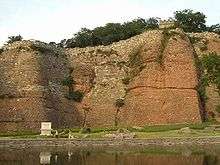Stone City

The Stone City (Chinese: 石頭城; pinyin: Shítóu Chéng)[1] is the site of an ancient fortified city within Nanjing, Jiangsu province, China. Almost all of the original city is gone; all that remains are portions of the massive city wall.[2]
History
The original town was built during the Warring States period (475-221 BC) by people from the Chu kingdom. The city was expanded during the Later Han Dynasty and a wall, about 9,000 metres (5.6 mi) in circumference, was built around the Chu-era city.[3]
Sun Quan (182-252), ruler of the Wu Kingdom, had what is now called Stone City built on a hill overlooking the Yangtze. It was used for naval training by General Zhou Yu (175-210).[4] On a political visit to the area, the prime minister of the Shu Kingdom, Zhuge Liang (181-234) described the Qingliangshan Hill and Stone City area as "Zhongshan curling like a dragon and the Stone City crouching like a tiger".[4]
The stone wall is all the remains from the ancient city.[4] The ancient city is strongly enough associated with Nanjing that Nanjing itself is sometimes referred to as "Stone City".
Park
One of the most famous of its landmarks is the "Ghost-Faced Wall". The ancient city wall from Caochang Gate (Chinese: 草场门) to Qingliang Gate (Chinese: 清凉门) has been strengthened to prevent it from collapsing.
Transportation
The area is accessible within walking distance north west of Hanzhongmen Station of Nanjing Metro.
See also
- Defence Park (Nanjing), within Stone City
- Qingliangshan Park, adjacent to Stone City
References
- ↑ Archived May 19, 2011, at the Wayback Machine.
- ↑ Archived April 25, 2012, at the Wayback Machine.
- ↑ Anecdotes of Nanjing 《南京掌故》 published by Nanjing Normal University Press Author: Chen Jimin on page 14-17
- 1 2 3 Stone City (Shitoucheng). China Internet Information Center. Retrieved May 16, 2014.
